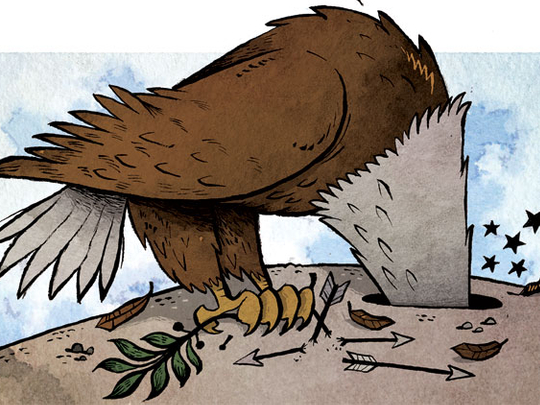
The US popularity worldwide is at its lowest since 2009. This was a recent BBC headline. The June 2013 BBC poll found that negative views towards the US are so pervasive that America presently ranks as the second-most unpopular nation in the world. The decline in US popularity was the sharpest during 2012 — it went from 47 per cent to 40 per cent, which was the same where it was in 2009 when the BBC headline at the time had declared that the world view of the US went from bad to worse.
In December 2013, the Pew annual survey found that a full majority of Americans, 70 per cent, said the US was losing respect internationally. A growing number of Americans believed that America’s global power and prestige were in decline. The survey also found out that the American public was growing extremely sceptical about the country’s international involvement. Today, domestic support for US global engagement is near historical lows and an increasing percentage of Americans want the US to mind its own business and pay attention to problems at home rather than get entangled in international crises.
Another end-of-the-year BBC survey in 2013 asked people which country did they think was the greatest threat to peace in the world. The US topped the list by a substantial margin. Pakistan was at a distant second place. The US ranks even higher as a perceived threat to world peace among people in the Middle East. The widespread use of drones and surveillance are reasons that are often cited for this impression of the US as a major menace to world peace.
How does this hugely negative public opinion of America around the globe resonate in the corridors of power in the deeply divided Congress? Does this concern the forever bickering folks in Washington? Is it of any immediate interest to the visibly confused Barack Obama and his consumed administration?
The quick answer is apparently ‘no’. There is not one shred of evidence to indicate that they have any impact on policies or induce any reaction. A dysfunctional Washington is too detached these days from home and international realities and seems to live in a bubble of its own.
Politics in Washington, like the TV series House of Cards, is fun to watch but sadly America is living a moment of great political paralysis and extreme disunity in the once-decent American body politics as told by Alexis de Tocqueville. As Washington fails to function, the world is watching the tale of the two sharply divided Americans: Republicans versus Democrats; rich versus poor; black versus white and the North versus the South. This political paralysis comes at a moment when the US is about to cross a historical milestone and retreat to number two in global power rankings. For the first time in about 200 years an Asian power, not a western power, will be the number one economic powerhouse in the world. This is bound to happen in barely five years from now.
Pulling apart
How can a completely paralysed Washington deal with the imminent challenge of becoming number 2? Is Washington prepared to stomach the number-two ranking or will politicians, intellectuals and the US think-tanks indulge in wishful thinking that this is not going to happen? America is currently confronted with some very serious choices. Yet, Washington is laterally incapable of making them. Extreme forces are pulling America apart. There is no centre any more in American democracy. Washington’s politics of the 21st century has become the art of the impossible not the art of the possible. The nation’s capital is not delivering and no one is in the mood to compromise. America is virtually at a point of perpetual deadlock. Trust, or the lack of it, is at the core of the current malaise in American politics. Trust is in short supply these days in America in toto. Republicans will never trust Obama just as Democrats had a hard time trusting George W. Bush.
The wheeling-dealing politicians in Washington live in foxholes of their own making. They are fortifying their positions for the next election, the next legislative fight and next TV show. They get on each other’s nerves, and 80 per cent of Americans have already given up on Washington politics. It is not just the Congress, but even the once-popular Obama had his approval rating hit a new low in a March 2014 survey. American’s do not trust him as much as they did a year ago.
They say he looks impotent and unable to pursue the Congress to do even little things. No
wonder the US looked so miserable in the latest opinion polls. According to the Edelman Trust Barometer Survey, confidence in the government had dropped sharply by 10 points — from 59 per cent to 49 per cent in 2014. Just 10 years ago, the US looked formidable and the story then was of America the Superpower of the 21st Century. The story now is that of a retreating and visibly paralysed America. It fits into Fareed Zakaria’s thesis that we are in the “post-American world”.
As for the view of the US among its close friends in this part of the world, the key word is “unreliable” America. This was succinctly stated last week by a senator during a congressional hearing. He said: “Our allies around the world are asking: Why are we still allying ourselves with the US? They are unreliable. Their government is always bickering. They cannot come together in Washington to do anything. Do you think, if we are ever invaded or ever get into trouble, the United States could possibly muster the political support necessary to come to our assistance? Do not count on America any more.
The America of 2014 is viewed around the world as fading and unreliable — one that cannot be counted on.
Dr Abdulkhaleq Abdulla is professor of Political Science. You can follow him on Twitter at www.twitter.com/Abdulkhaleq_UAE










